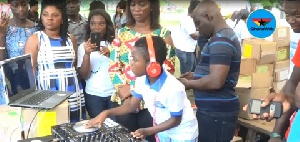Ghana on Friday joined the rest of the world to commemorate the Day of the African Child.
The Day, which was initiated by the Organisation of African Unity, now the African Union, had been commemorated since 1991 to among other things, honour the memory of the gallant children who were killed by security forces in Soweto, South Africa for protesting to demand for their rights to quality education in 1976.
The annual event for Member States, therefore, seeks to reflect, sensitise, and strategize on current welfare and development issues, draw the attention of all actors to prevailing child development issues and challenges, and unite efforts towards improving the conditions of children on the continent.
Madam Otiko Afisah Djaba, the Minister of Gender, Children and Social Protection, said the theme: “The 2030 Agenda for Sustainable Development for Children in Africa: Accelerating Protection, Empowerment, and Equal Opportunity”, was important to provide a clear direction to Member States and partners on the objectives and expected outcome of the event.
She said with the failure to meet expectation of the Millennium Development Goals (MDGs) by the end date, although some notable gains were made, it was anticipated that the Sustainable Development Goals (SDGs) would turn things around, to ensure a world of safety for all children.
She said its 17 goals were all relevant for children as reinforced one another, out of which eight of them secured child rights and prepared them for responsible adulthood.
Madam Otiko said African children faced similar challenges which ranged from child marriages, teenage pregnancies, child labour, and diverse forms of abuses which included trafficking and being used as commercial sex workers, and although Ghana’s laws prohibited such engagements and exploitations, it had faced great challenges in prosecuting the perpetrators.
She gave some underlying factors of these issues as poverty, negative socio-cultural practices, poor parenting and disparities in national development.
She said the Gender Ministry together with its partners had invested heavily in addressing these issues, and were currently implementing the Child and Family Welfare, and Justice for Children policies, which would make families and communities key to the growth and development, as well as offer appropriate protection to children in conflict with the law.
She said beyond these policies, the Ministry was confronting household poverty through its Livelihood Empowerment Against[e1] Poverty (LEAP) Programme, while other social intervention initiatives such as the National Health Insurance Scheme, Free Secondary education, the National School Feeding and Capitation Grant, were being implemented.
“We are campaigning against child marriage. No girl should be a bride as it truncates their education and limits opportunities to develop their potentials,” she said.
She said a five-year strategic plan to end teenage pregnancy had also been developed, to ensure that girls completed their education and acquired skills for productive lives.
Madam Otiko pledged the Ministry’s sustained focus on addressing the critical issues and challenges that affected the development of children and called for strengthened stakeholder support towards the implementation of the SDGs.
There were solidarity statements from institutions including the Diplomatic Corps, Plan Ghana, UNICEF and the World Vision, who pledged their commitment to supporting government in accelerating, protection, empowering and providing equal opportunities for all children.
General News of Friday, 16 June 2017
Source: ghananewsagency.org
Ghana commemorates Day of the African Child
Entertainment












